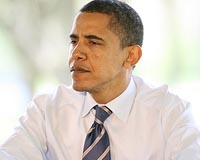 |
Washington (UPI) Aug 2, 2010 The United States is losing the nuclear forensics skills that could help identify the source of a nuclear weapon used in a terrorist attack, a report says. The highly specialized detective work, called nuclear attribution, studies clues from fallout and radioactive debris to discover the identity of the attacker and the source or manufacturer of the weapon, a National Research Council study published last week said. Arguing that nuclear terrorism is a serious, long-term threat to the United States, federal officials have sought to improve such analytic skills in recent years. The NRC report, requested by the Department of Homeland Security, the Defense Department and the National Nuclear Security Administration, found U.S. forensic abilities "fragile, under resourced and, in some respects, deteriorating." "Without strong leadership, careful planning and additional funds, these capabilities will decline," the report warned. Most of those capabilities are in the laboratories that maintain the nation's nuclear arsenal that had their heyday during the cold war but are now struggling to attract personnel, get funding for projects and establish new identities, the report said.
earlier related report France will send its Japan embassy's charge d'affaires to take part in the annual remembrance ceremonies in the two cities on August 6 and 9, a deputy spokesman for the ministry, Christine Fages, told reporters. "It is the first time France has participated in this event," she added. As well as remembering the dead, France aims "to reaffirm its will to achieve a safer international environment allowing all aims of the Non-Proliferation Treaty to be fulfilled, notably in terms of nuclear disarmament." On August 6, 1945, a US B-29 bomber dropped an atomic bomb on Hiroshima, incinerating the city and killing 140,000 people in the first nuclear attack in history. Three days later, the United States dropped a second bomb on the port city of Nagasaki. About 150,000 of the city's 240,000 residents died instantly or succumbed to their wounds or sickness. The bombings led to Japan's formal surrender in the war on September 2, 1945.
Share This Article With Planet Earth
Related Links Learn about nuclear weapons doctrine and defense at SpaceWar.com Learn about missile defense at SpaceWar.com All about missiles at SpaceWar.com Learn about the Superpowers of the 21st Century at SpaceWar.com
 Obama backs Israel on nuclear conference
Obama backs Israel on nuclear conferenceWashington (AFP) July 6, 2010 US President Barack Obama warned Tuesday that attempts to single out Israel over its undeclared nuclear program could scupper a Middle East regional nuclear conference planned for 2012. Obama delivered the warning in a statement about his talks with Israeli Prime Minister Benjamin Netanyahu, in which he gave Israel a veiled, but public assurance over its strategic nuclear ambiguity. "The ... read more |
|
| The content herein, unless otherwise known to be public domain, are Copyright 1995-2010 - SpaceDaily. AFP and UPI Wire Stories are copyright Agence France-Presse and United Press International. ESA Portal Reports are copyright European Space Agency. All NASA sourced material is public domain. Additional copyrights may apply in whole or part to other bona fide parties. Advertising does not imply endorsement,agreement or approval of any opinions, statements or information provided by SpaceDaily on any Web page published or hosted by SpaceDaily. Privacy Statement |